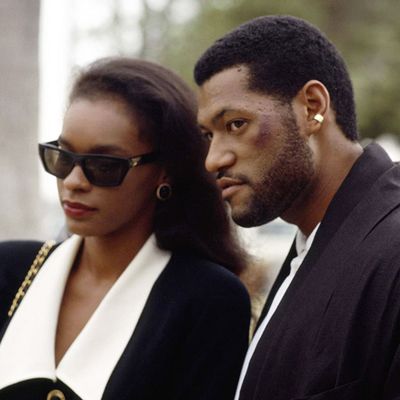Friday Night Movie Club
Spend an evening with Vulture, every Friday at 7 p.m. Save this article to read it later.
Find this story in your accountsSaved for Latersection.
Head toVultures Twitterto catch her live commentary, and look ahead atnext weeks movie here.

Language fails me right now.
Ive been seeing real moments of joy followed by images of bloodied marchers in the aftermath of police brutality.
Thats necessary, too; we all need some balm.
We cant endlessly observe horror and apathy and expect to survive.
Its characters are usually archetypal detectives, femmes fatales, criminals, people on the fringes of society.
As a result, noir has a prickly relationship to race.
Its a brief scene.
But his ease is a tell.
Hes comfortable in this space.
But what happens to noir when blackness isnt a suggestion but a fact?
Its Christmas, 1972.
Snow-dense streets are framed by twinkling lights as Silent Night hums along.
So gather round as I run it down and unravel my pedigree, adult Russell muses in voiceover.
He furiously notes in voiceover that this moment was a turning point for him.
It wasnt going to happen to me, he says.
This memory haunts the film.
Do you know the difference between a black man and a nigger?
Agent Carvers asks the black recruit ahead of Russell, who stammers a response.
Thanks for coming in.
Next, Carver replies.
Its the response Carver was looking for.
As an example of noir,Deep Coveris as beguiling as those early films from the 1940s.
Its language dances and jabs at you as its fraught male characters spit homophobic and racist jargon around Russell.
It uses shadow and light across an urban landscape to reveal the inner darkness carried within these men.
ButDeep Coverpushes the genre.
Its use of wipe transitions gives the feeling of peeling back layers of story.
Its coloring is more garish and beckoning cherry reds and cobalt blues punctuate inky blacks.
What if black film could be something other than embodied?
What if black film was immaterial and bodiless?
Michael Boyce Gillespie asks inFilm Blackness: American Cinema and the Idea of Black Film.
What if black film could be speculative or just ambivalent?
What if black film is ultimately the worst window imaginable and an even poorer mirror?
It isnt merely thatDeep Coverplaces a black man in the context of noir; representation alone isnt worthwhile praxis.
Itpushesthe form, allowing notions of black hunger, black desire, and the black absurd to take root.
Consider the dynamic between Russell and David Jason (played by an at times beautifully unhinged Jeff Goldblum).
The law of the street is that Russell must exert himself, enact vengeance.
He remains frozen in place even as Ivy pisses on his shoes.
His chest heaves, his eyes dart.
Until, he draws his gun and shoots Ivy twice.
I had killed a man.
A man who looked liked me.
Whose mother and father looked like my mother and father.
In killing Ivy, the mask of John Hull slips off.
This slippage is common in noir.
Even the ending ofDeep Coverrebukes the common expectations of noir: Russell survives.
Hes no longer a cop, or a drug dealer.
An impossibility, I believe.
In doing so,Deep Coverreminds us now is not the time to look away.